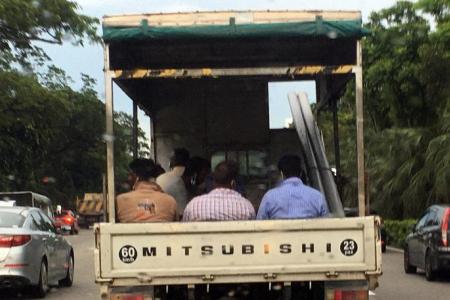Lorries ferrying migrant workers to be equipped with speed limiters
All lorries ferrying migrant workers will now be equipped with speed limiters and must have a designated person in the vehicle who can stop the driver if he is too tired or driving in an unsafe way.
The Manpower Ministry (MOM) will also introduce new rules to make sure drivers ferrying migrant workers, especially those who also work onsite, have enough rest. This is on top of existing regulations that cap working hours to 12 hours a day and up to 72 overtime hours a month.
Senior Minister of State for Transport Amy Khor on Wednesday (March 9) announced these new measures to better protect migrant workers being ferried in lorries, while reiterating the difficulties of transporting all workers in buses.
She was responding in Parliament to Mr Melvin Yong (Tanjong Pagar GRC), who, along with other advocates, has been asking if it was possible to do away with transporting migrant workers by lorries altogether.
The new speed limiter rule for lorries extends such devices to the last lorry category currently not mandated by law to have them - lorries with a maximum laden weight exceeding 3,500kg.
Those with a lower maximum laden weight already must have speed warning devices, while heavier goods vehicles with maximum laden weight exceeding 12,000kg must be equipped with speed limiters.
Dr Khor did not say what the speed limit will be for these new lorries. The traffic police is working with the industry and more details will be released later, she said.
In addition to new manpower and speed laws, Dr Khor also said all lorries used to ferry workers must be fitted with rain covers, which are waterproof canvas tarps, to protect the workers against inclement weather.
On the challenges of ferrying workers in buses, she cited how smaller companies that hire migrant workers said they have to transport a small crew with bulky equipment to several locations in a single day, making lorries the most efficient vehicle for this dual purpose.
Private bus operators also said that there were simply not enough buses and drivers to transport the more than 280,000 workers in employed in the manufacturing and construction and marine sectors.
"A full transition to buses could require a doubling or even tripling of the number of large private buses in the industry today. Even if multiple and staggered trips are made, the demand for buses will still be significant," Dr Khor said.
"Furthermore, the bus operators shared that the shortage of bus drivers would be an even more binding constraint."
But she also did not rule out a future where all migrant workers will be transported by buses.
"These challenges are not all insurmountable, but we will need time to work through them with the industry and relevant agencies," she said.
"We encourage more in the industry (to use buses). We will facilitate the sharing of best practices, and will study the conditions for success to enable more companies to make the shift."
Some firms have already shifted away from using lorries for some projects, she noted.
Tong Tar Transport, a multinational construction company, has ferried about 3,000 workers between to dormitories to construction site via buses - an endeavour that required various bus operators to work together, even during a season when tourism levels were down.
On calls for lorries to be fitted with seatbelts, Dr Khor said her ministry has recently consulted motor dealers and workshops.
"Their feedback remains that retrofitting seatbelts would not be feasible and could in fact pose safety risks," she added.
"Commercial lorries today are not designed for seatbelts to be installed in the rear deck, as the floorboards in the rear deck might not be sufficiently strong to keep the seatbelts anchored in the event of an accident.
"There are also liability issues for such modifications without the support of the lorry manufacturers. Without the industry being able to bring in lorries with seatbelts and vouch for their safety, it is not prudent to mandate this."
Get The New Paper on your phone with the free TNP app. Download from the Apple App Store or Google Play Store now


